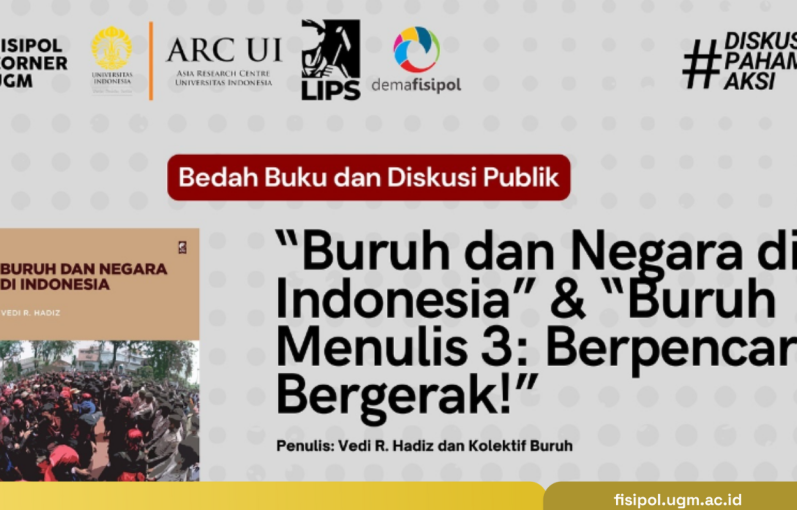
Yogyakarta, January 15th 2025 ─ Looking at the movement of labor organizations in Indonesia, Fisipol Corner of Universitas Gadjah Mada held a book review session of Labor and the State in Indonesia and Labor Writes 3: Split, Move on Wednesday (15/1). Both books contain reflections on labor experiences that are packaged in history so as to produce a picture of the political economy situation from time to time.
Vedi R. Hadiz, author of Labor and the State in Indonesia, states that the cultural condition of the current government’s fundamental system is not much different from the New Order. Starting from the question of why the voice of workers is still weak, even though democratization has been running after the reformation, Vedi thinks that this condition is due to the complex situation of the government. “Even though during the new order, the institutions and the government were destroyed, the power relations are still running until now,” explained Vedi.
According to Vedi, the government in its efforts to control society is to form bodies or institutions that regulate each group of society. The existence of this institution is not used as a forum for people’s representation, but an effort of oppression. This is often found in cases involving organizations and elements of society itself.
“We can see from the example of religious organizations or other mass organizations. The ideology of Pancasila is very conservative. We are indoctrinated that if we do radicalism or movement it is not Pancasila,” said Vedi. This understanding causes people’s voices to be suppressed by institutions, as well as ideology. In the end, even voicing the rights of the people–in this case workers, will be increasingly difficult because these ideas are trying to be weakened.
In line with that, Hari Nugroho, a political expert at the University of Indonesia, provided an overview in terms of the storyline portrayed in the book Labor Writes 3: Scatter, Move. This book tells a series of labor experiences from a personal point of view, how workers are affected by social, economic, and even political conditions of the government. For example, a laborer who does not have protection of their workers’ rights will be easily controlled by market conditions.
“The book tells us that when market conditions rise, there is a lot of demand, and companies will set targets. Of course, workers have to work harder, this is what I find interesting because it illustrates post-reform capitalism,” explained Nugroho. He said there is a close link between verbal violence and the form of control from the ruling regime.
One of the most interesting quotes, Nugroho says, is the line “I was born to serve machines”. The sentence is considered to be a harsh illustration of how capitalism binds and exerts tremendous oppressive power on labor. “Although it covers the micro scale, the labor context is more flexible. This is a generation born out of diverse industrialization regimes,” said Nugroho.
Representative of the Indonesian Workers Union (SPSI), Irsad Ade Irawan also provided a view from the field. In fact, the voice of labor parties today is still very small, at a percentage of 0.6% of the total public vote. This gives the reality that only a small part of the community has the same perspective as the labor party. Even so, the percentage of its membership continues to rise from time to time.
Irsad explained, during 2016-2018, the number of labor party confederations rose to 2 million. Then in 2020, it rose to 3 million. Not only that, there is a growing trend in the demands or advocacy brought by labor parties. For example, in the past workers only fought for an increase in salary or working hours, but now the issues raised are increasingly widespread. In fact, national issues such as fuel increases, taxes, gender, health policies, and politics are also raised.
“The goal now is no longer to fight for demands. But how can labor parties get votes from the public, so that they can be eligible to nominate and be nominated as leaders of the country,” said Irsad. The discussion on the issue of the labor organization movement specifically illustrates the issue of the welfare of community groups. Fisipol Corner is a form of contribution from the Faculty of Social and Political Sciences of UGM to elaborate the issue of labor so that it has a place in public discourse.
